Patcy N
I Me Aur Main director Kapil Sharma speaks to Rediff.com's Patcy N about his father astronaut Rakesh Sharma, John Abraham and how he turned out the way he did.
Following his father's footsteps would have been a tough act for Kapil Sharma -- after all, his astronaut dad Rakesh Sharma was the first Indian to travel in space.Kapil chose another career: The movies.
After 10 years in the film industry, Kapil directed his first movie, I Me Aur Main, starring John Abraham, Chitrangda Singh and Prachi Desai, which released March 1.
Kapil spoke to Rediff.com's Patcy N about his father, John Abraham and how he turned out the way he did.
You were pretty young when your father went into space, the first by an Indian. Do you remember anything about it?
I was 10 and I remember everything. I knew by the age of four or five what a fighter aircraft was and what they did. I knew what my dad did.
My father was in the Air Force and posted in Bangalore. Sometimes, after night flying, they don't go back to the crew room, but come back home with the equipment.
For me, at the age of four or five, that was terrific when he came home with helmet and oxygen mask. I would wait for him to go on night flights just to see him in his clothes.
When he removed his helmet, I would wear it and imagine I was sitting in the cockpit of a fighter plane.
When I came to know my father was to go into space, Star Wars had come by, so I had an idea of what was going on. For a kid it was like going to an amusement park.
Tell us about the time your father left for the mission.
The families are separated from the men who are going to fly about a month-and-a-half in advance. It is standard procedure worldwide. So the goodbyes happened quite early before he went.
The day he went into space, we watched him on television and mom spoke to him on television.
We lived in Moscow for a year-and-a-half when this project was going on, because dad's training was almost for two years.
The main launch took place in Kazakhstan. The family stays in Moscow and when there is an opportunity to speak, mom would be taken to mission control in Moscow and she would speak to dad.
...
'In school, I was a star'
Image: Kapil Sharma, Chitrangda Singh, John AbrahamYou remember the day he spoke to Prime Minister Indira Gandhi from space?
I remember that, but I have to be honest about it. I had a bad stomach ache and everybody thought I had appendicitis and I was rushed to hospital. I saw the recorded show later on video.
When he came back, we spent a month in Moscow and then moved back to India. It's when we came to India that we realised how big this thing was for India.
Your father was a hero here, so when you came to India were you also a semi hero?
I did get reflected glory as I was the son of this incredibly famous man.
We didn't realise till we came to India -- because we had no access to Indian television -- how it had captured the nation's attention in a big way.
In school, I was a star. I didn't always want that attention, but I got it by default.
Did your father change after all this attention?
I think to dad's credit he never changed. A lot of air force guys are like this. They do high-risk jobs, they know life can go any time, so I don't think such things matter to them much.
When I was growing up, I knew so many friends... their fathers play with their kids one day and the next day there was a crash and they were not there.
Doing this job means they live by a certain code. Dad was in his mid-30s when he went into space. It means he was a fighter pilot for over 10 to 15 years before that, so his approach was different. He made sure he was grounded.
He got a lot busier. That was a big adjustment for us. He was almost never around. He would go for months on tours.
You were in boarding school, so how much time did you get to spend with him?
I was in boarding school, but it was a cool place to be, Rishi Valley. I would come home every four months so I wasn't away that much.
Today my father has retired and he stays in Coonoor, in Tamil Nadu, where the Defence Service Staff College, Wellington, is. He loves staying there.
...
'I loved watching movies and everything about it'
Image: Chitrangda SinghHow did you develop an interest in filmmaking?
In school and college, I was always interested in theatre and plays. I did a lot of backstage work, costumes and rehearsals with the actors.
I loved watching movies and everything about it and somewhere in my middle teens I wanted to know about the process of filmmaking.
In school, every four months there would be a social or cultural event. Once a year we did a class play which was a big event.
We watched movies every weekend in a small auditorium, mostly Hollywood movies and once in a while, a Bollywood film.
In my early teens I was asthmatic, so I was kept in a huge room alone. I would read a lot, everything from Hardy Boys to science fiction, and all these things developed my keen interest in filmmaking.
I graduated in environmental science from St Joseph's in Bangalore. I could see there was a story in what I was studying -- it was a socio-economic, political, poverty story.
I thought it was necessary to communicate to people and tell them about the different environmental projects coming to India at that point of time. That's when I thought of doing mass communication.
I did a master's from Pune University in mass comm with a specialisation in video production.
After that, I worked for around three years on TV. I was in the production department making news features. Then I worked with a small production house; we did a fictional mini series for Doordarshan.
But I wanted to get into movies so I went to the US for further training at the International Film and Television Workshop in Maine. I learnt technical skills like cinematography, script writing, direction.
In the mid-1990s, we (in India) were also finding our feet in television and feature film making so I wanted a well rounded experience of everything that goes into filmmaking.
I came back from the States at the end of 2001.
...
'I was not a rebel'
Image: I Me Aur Main producers Shristi Arya and Goldie Behl, actors Chitrangada Singh and John Abraham.Absolutely. When I was very young I wanted to be a fighter pilot. But my dad realised his son was a little more curious than other kids about many things.
It was obvious that I loved movies. He felt that somebody with such varied interests going into the air force might be constraining.
At that time, we (India) were liberalising and the world that they (his parents) grew up in and knew and the world that we grew up in had completely changed.
My father realised that, so he allowed and encouraged me to do things that I wanted to do beyond the air force and not necessarily filmmaking.
When you chose filmmaking, did your father think he had given you some slack and you ran away with it?
I am sure he must have thought that. My mom and dad must have gone through that. But to their credit, they were incredibly supportive.
The role that they played when I was making decisions was just cautionary. They told me to get professional skills and asked me to get into communication media so that I become hireable at least.
It made sense to me too, so I learnt all those things. They paid for my master's and when I went to the US, I took a loan and my father was my guarantor.
I was not a rebel. I did everything with their permission and they helped me too.
Was it easy for you, being an outsider, to enter the film industry?
Yes, it was difficult. I was an outsider and plus they would say yeh toh firangi hai sochta hai sab kuch janta hai (he is a foreigner, and thinks he knows everything), because I had studied abroad.
I started going to producers and directors to get a job. I knew camera work also, which was an added advantage.
In our profession, AD (Assistant Director) is an entry level position to becoming a director and getting into films.
We don't have that many training institutes so people in our industry think that they will hire a person and the person thinks that he will learn on the job.
But there is so much work and running around that the person who joins to learn hardly gets a chance to learn.
But there is a small community like me and Apoorva Lakhia (the director who gave him a break in his first movie, Mumbai Se Aaya Mera Dost) who are trained ADs.
Apoorva had worked with Aamir Khan on Lagaan and Kaizad Gustaad's Bombay Boys.
Lagaan changed his career in a big way. Apu (Apoorva) and I had worked together on Boom, so when he started his first film, he got me in too.
...
'By 2006, I decided it was high time I started directing my own films'
Image: Mini Mathur, John Abraham in I Me Aur MainYou assisted directors from 2003 to 2012. Did you never think of directing a movie yourself?
From 2003 to 2008, I was a freelancer. I was working on foreign and Indian jobs as well.
I wanted to direct, but the opportunity -- because you are an outsider -- comes more slowly.
You have to get into the network. I got a chance to work with different directors. I was having a ball. I was getting to learn a lot.
If I had to start directing a film, I had to take time off, to get a good script written by somebody and then approach a producer, but then you can't take time off, you have to pay your bills.
Did you ever think of going to Yash Raj Studios or Dharma Productions and telling them to give you a chance?
When I was freelancing, YRF did approach me to do work, but at that time, I had some date issues, so I was not able to go there.
It was tempting, because YRF does launch people.
The same happened when Dharma approached me. I was either working on some foreign project or was busy with Ghajini or Being Cyrus. I was very busy as I was working on ads too.
By 2006 I decided it was high time I started directing my own films.
While I was working on Drona, the producers approached me to direct a film for them.
So in 2008 and 2009 we started writing the script and in 2010 we did the casting and between 2011 and 2012 we started shooting the film.
John (Abraham) had a busy schedule so we had to wait a bit.
...
'John identified with the character'
Image: Raima Sen and John Abraham in I Me Aur MainYou wrote the script with John Abraham in mind?
When writing the script, the idea of casting John came to my mind. I think John suits the character absolutely.
John identified with the character. He said there are parts of his life in the film; he has been selfish in his life.
There are four women in the film?
No, there are six women in John's life. I am counting the mother and the sister as well.
This is a story of an urban Indian man and his relationships with different females in his life.
The mother is played by Zarina Wahab, Mini Mathur plays the sister. Chitrangda Singh is the girlfriend that he is living with.
The female boss is played by Raima Sen, his protege is played by Sheena Shabadi, and the girl next door is played by Prachi Desai.
What made you sign Chitrangda?
When you signed her, she was mostly doing serious roles.
We wanted a gorgeous, good looking, couple. We wanted someone who could represent independence of her own, but at the same time have some femininity and vulnerability.

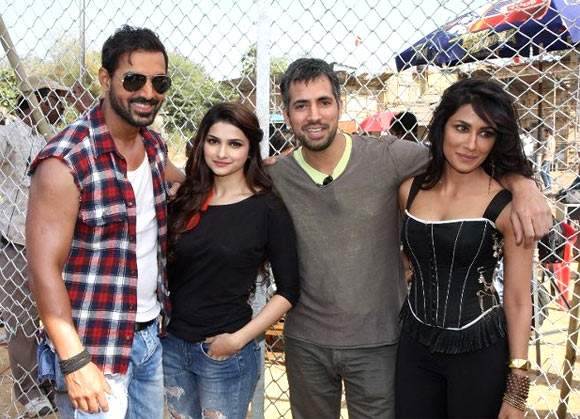
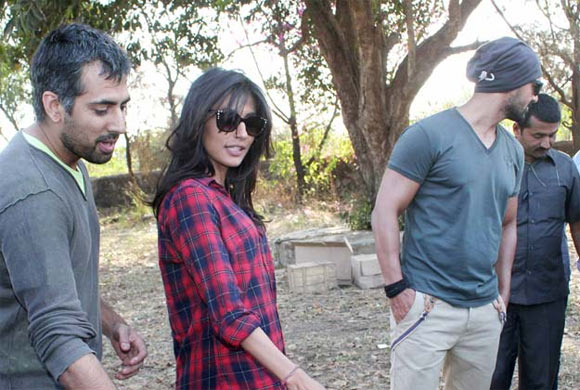
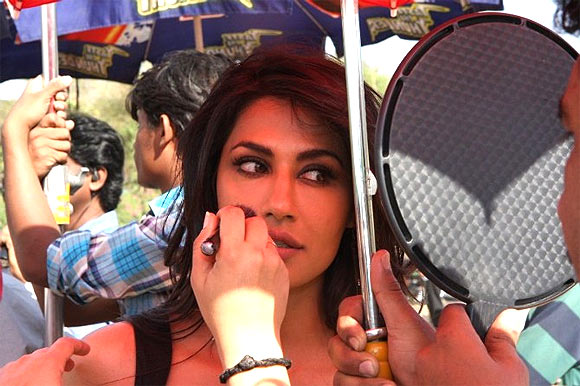
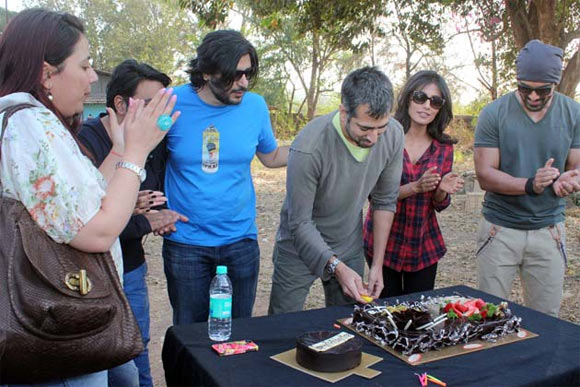
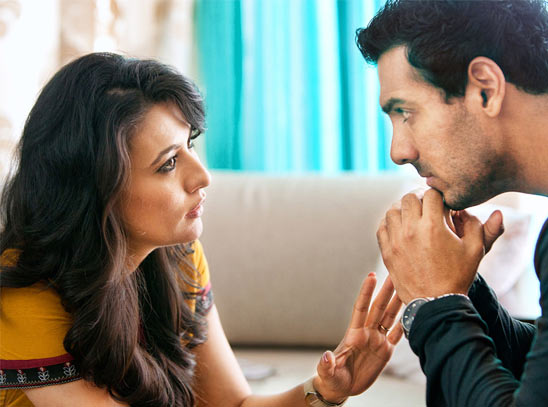
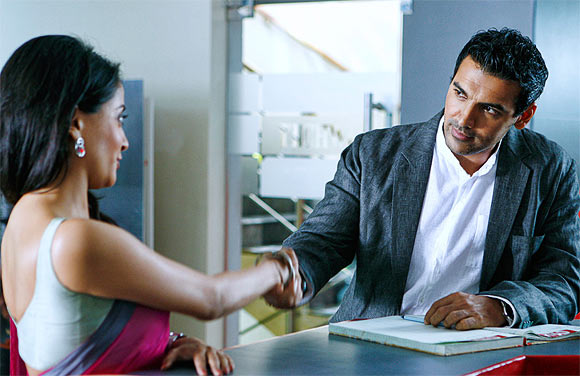
Comment
article